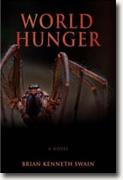World Hunger
Brian Kenneth Swain
book reviews:
· general fiction
· chick lit/romance
· sci-fi/fantasy
· graphic novels
· nonfiction
· audio books
· author interviews
· children's books @
curledupkids.com
· DVD reviews @
curledupdvd.com
newsletter
win books
buy online
links
home
for authors
& publishers
for reviewers

 |
World Hunger Brian Kenneth Swain iUniverse Paperback 312 pages August 2007 |
|
When I was in college, I took a genetics seminar that turned into an ethics class whenever we became too engrossed in the coursework. Did we have a right to pursue this topic? Would we share responsibility for how others used our discoveries?
Vanguard hasnít risen to the top in their business by being overly cautious and risk-shy. CEO Robert Chase discounts his researchers' warnings that the current seeds arenít pest-resistant enough for field trials. Simultaneous tests are scheduled for four different crops in Belarus, India and South America. These sites provide a range of climates while avoiding Western Europe, where there would be too much political exposure. The crops grow quickly. Unfortunately, the insects that eat the crops also benefit from the growth enhancements engineered into the plant seeds. They grow abnormally larger, consuming the crops, devouring domestic animals and attacking people. There are human deaths. The usual pesticides are no match for these monstrously enhanced pests. While the researchers race to close this Pandora's box by developing a means to eradicate these insects, the company faces the wrath of environmentalists, the media and the government. Swain makes it clear that he does not necessarily consider all genetically-modified crops to be Frankenfood. He understands the noble attempts to ease world hunger, but he points out the need for slow and thorough research and development each step of the way. This book is well-researched, containing both a bibliography and a glossary of terms. The glossary contains only 18 entries, so don't fear: the writing is layperson-friendly, and the short chapters heighten the tension of the story. One of the modified crops is bananas, and the banana spiders associated with those plants in the book grow to more than 12" across. I'll admit to dropping my purchased banana bunch into a bucket of water to flush out any possible spiders lurking inside... Originally published on Curled Up With A Good Book at www.curledup.com. © Midge Bork, 2008 |
|
|
|
 Click here to learn more about this month's sponsor! |
|
| fiction · sf/f · comic books · nonfiction · audio newsletter · free book contest · buy books online review index · links · · authors & publishers reviewers |
|
| site by ELBO Computing Resources, Inc. | |
 Swain's main characters are biochemists transplanted from academia to Vanguard Life Sciences Corporation, the world's largest, and most profitable, agribusiness and life science company. Phillip Barett and Julia Croft conceive Project Evergreen to develop a process for manufacturing genetically-modified seeds, working to make the process generic enough to be applied across a variety of crops. Their goal: to reduce world hunger by producing seeds that are more disease and pest-resistant, drought-tolerant, and faster-growing, with high yields and nutrition.
Swain's main characters are biochemists transplanted from academia to Vanguard Life Sciences Corporation, the world's largest, and most profitable, agribusiness and life science company. Phillip Barett and Julia Croft conceive Project Evergreen to develop a process for manufacturing genetically-modified seeds, working to make the process generic enough to be applied across a variety of crops. Their goal: to reduce world hunger by producing seeds that are more disease and pest-resistant, drought-tolerant, and faster-growing, with high yields and nutrition.